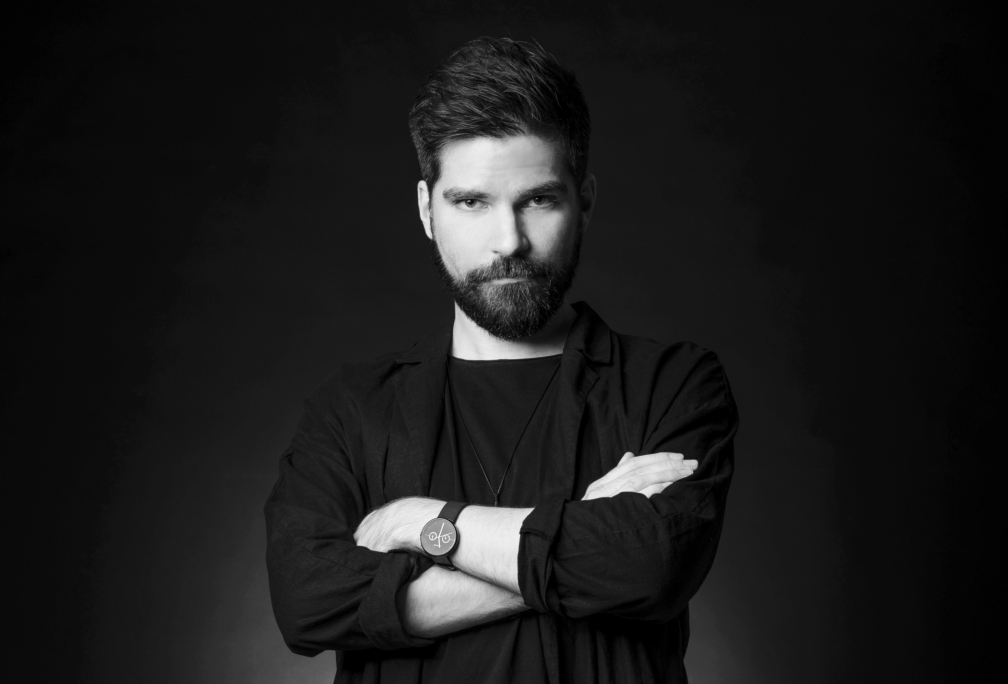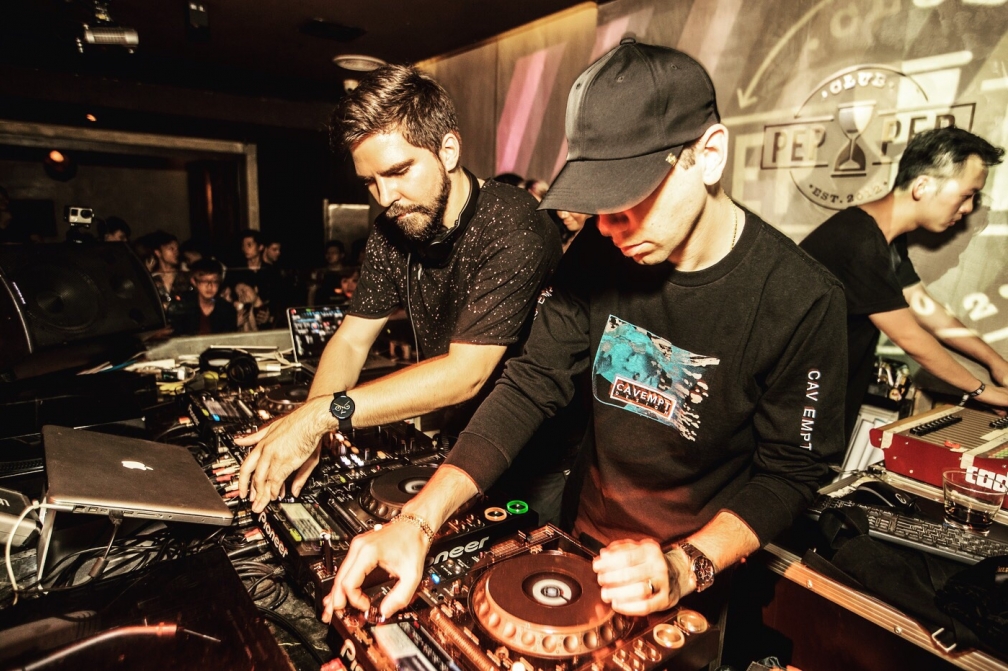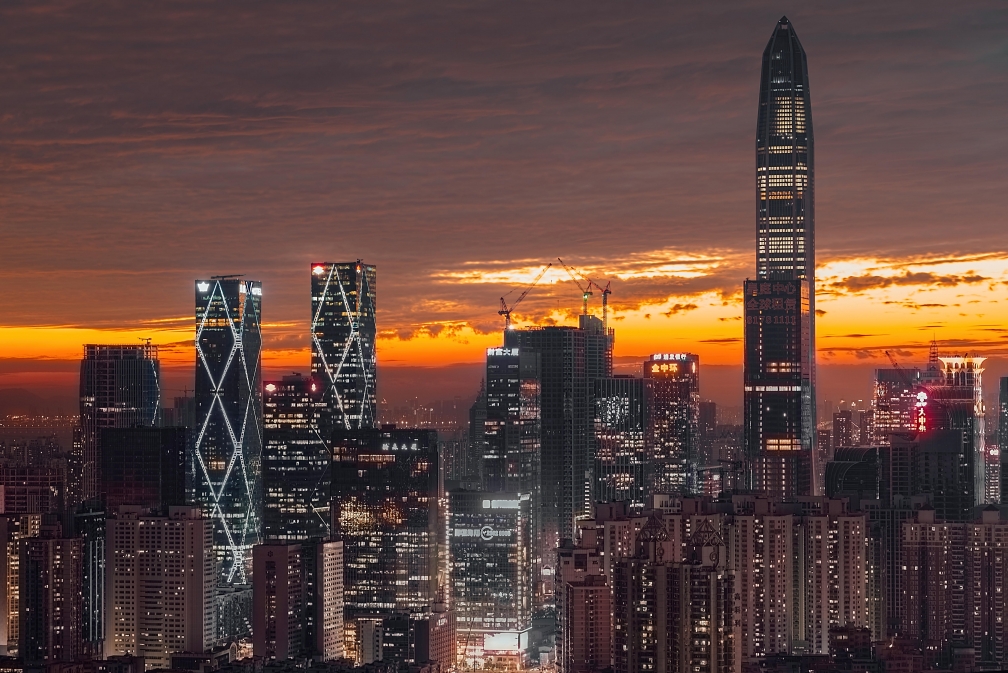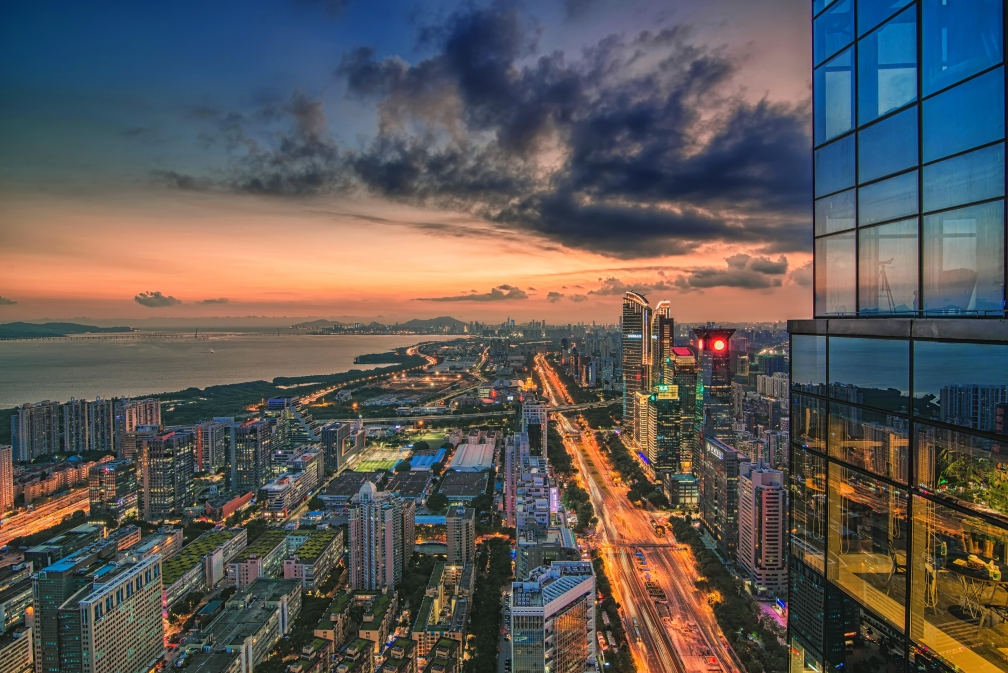 Interviews
Interviews
Hello: Tomasz Guiddo
Get to know the man putting Shenzhen on the map
Who: Tomasz Guiddo
Where: Shenzhen
Sounds like: eclectic mixture of deep house, techno and Balearic beat
For the first time ever, stories from Shenzhen, a sprawling yet silent city just across the bay from Hong Kong, have begun to permeate through the international electronic music community and Tomasz Guiddo has been a major force in the storm brewing over there. The DJ, composer, multi-instrumentalist, producer, sound designer and radio journalist is a booker and resident DJ at Pepper Club, one of the city’s seminal dance music clubs, co-owner of Lavo Jazz Bar, co-founder of VINYLHOUSE Recordstore, music director of Shark Lounge and one of the curators of ChoP sound-art festival.
His unique and eclectic mixture of house, techno, disco, Balearic beat and nu-jazz perfectly echoes a music driven childhood of many melting pots. Tomasz grew up a guitarist and his early days were spent immersed in the very polar worlds of jazz, flamenco and heavy metal with music production dating back to primary school. When Jazz Radio Warsaw began playing DJ sets, he saw them as a source of inspiration in their seamless and fluid continuity but it wasn’t until a random trip to Tresor (at the age of 15) where something happened that until today, Tomasz can’t find the words to describe. But the next day, he went East Berlin and bought his first techno record: X-101 ‘Sonic Destroyer’.
He eventually moved to Berlin and then China with both city’s further influencing his style and sound as well as his live show where he uses sequencers, synthesizers and processed instruments that’s taken him from Berghain in Berlin to MoMA in New York, Love Parade in Berlin all the way to Kyo in Kuala Lumpur, Woobar in Bali and Potato Head/Hong Kong. His production catalogue sees solo tracks and remixes for Compost, Sonar Kollektiv and Beats In Space and recent collaborations also include names like Jamie Lidell, Ursula Rucker, Louie Austen, Kasar, Georges Perin.
We needed to place a face behind the stories so we threw 20 questions at Tomasz and he came back 20 eloquent answers and a mix. Get to know Shenzhen through the eyes of Tomasz Guiddo below.
What’s the best thing about living in Shenzhen?
It might be the location: good weather, relatively clean air, stunning nature around the city: mountains, cliffs, beaches. The city is huge, over 12 million citizens, highest skyscrapers in the world, high speed subway lines, newest technology. Hong Kong is just around the corner, I can see it from my window from the other side of the bay and it’s very easy to cross over to Hong Kong with a bus or train. So just imagine, you have two gigantic cities that never sleep right next to each other.
It’s very easy to travel around China and Asia from here. All those attractive destinations are only a few hours away, you can fly to Shanghai, Tokyo, Seoul, Bangkok, Bali.
I have been lucky running into great people that share the same vision and made me feel in Shenzhen like at home from the very beginning.
What’s the worst thing about living in Shenzhen?
The fact that the city is so young can be a downside as well. Many things may seem artificial or made too quickly, lacking a real story behind it. A lot of people show this money-making obsession, leaving art and creativity behind as secondary. But in such a busy city you can always find likeminded people and inspiring places.
Take us out for a night in Shenzhen – from dinner, drinks, party to afterparty?
Oh, you should start it much earlier, since you are next to the ocean, you know. There are amazing beaches and cliffs with great seafood restaurants in the east and beautiful mountains and artists villages (Wutong Mountain) in the north-east. You should also check out OCT Loft district if you’re into art and design or jazz and rock music. It’s a very beautiful, green and well designed post-industrial area with little galleries, boutiques, music venues and decent coffee.
The nightlife however happens mostly around Coco Park in the middle of Futian - the new center of Shenzhen. This is where most of the clubs and discotheques are located. It’s very busy and through the last 4 years it developed from cheesy entertainment into a quite decent dining and clubbing area with everything from good wine bars with lounge music (Shark) to craft beer pubs and coffee roastery and international style dancefloors.
Not so far away from Coco Park, on the 1st floor of Kerry Plaza, there’s also Lavo - our funk and jazz bar with live music and DJs playing funk, afro beat and disco re-edits.
As for afterparties, Shenzhen doesn’t really have this tradition yet. We are organizing these Sunday daytime events at Mars Live House and you can see that people who come there have slept before, put fresh clothes on and ate good breakfast.

You’ve released on some prolific labels like Beats In Space, Compost and Ostgut Ton. China is quite far detached from these industries. How do you stay current and find inspiration?
I’m used to long distance collaborations. I’m still cooperating with European and American artists and labels. But I’m also recording with local musicians and it’s very refreshing and inspiring. Not only Chinese. The little music scene here is quite international. There are some fantastic musicians from South Africa, Mauritius or Colombia. A combination of different musical approaches is extremely exciting for me. I’m discovering new things, new sounds, new scales. Sometimes it works and sometimes it doesn’t, but it’s always fun and often even quite a spiritual experience.
Of course I’m trying to follow the scene that I’ve left behind and I’m having European tours every summer. When I don’t travel I watch a lot of movies, documentaries and listen to podcasts, browse promos and spend lots of time on Junodownload and Discogs. Co-running a recordstore and having contact with different distributors also keeps me up to date. Basically nothing inspires me more than listening to good music. Reading books and magazines, especially biographies and interviews.
If you weren’t a DJ, what else might you be famous for?
Well... I don’t consider myself a famous DJ. That’s to start with. But if I weren’t a DJ and music producer, and these activities really keep me busy and consume most of my time now, I would probably focus more on new-media art. I was involved in many contemporary art projects before and I’m still doing it from time to time, but not as much as I would like to.
What five tracks could you play in your set forever?
Oh, that’s a tough one. I play at so many totally different venues, festivals, radio stations so my sets depend on many factors... but let’s try:
1. Tooth Faeries 'Dust and Ashes (Crooked Ashes)'
2. Pacific & Loverman 'From Outer Space' - which is a re-edit of John Cooper Clarke - I Married A Monster From Outer Space
3. Emotions 'I Don't Wanna Lose Your Love (Edit)' - I could listen to the hook of this song in a loop for the rest of my life and not get tired
4. Ess O Ess 'Cantilate (Suzanne Kraft Remix)' - It's one of my favorite 2015 releases and even if I don't play it I keep it in my record bag
5. Michael Ozone 'Oxygen' - This track does the magic each time I play it, especially at open-air afterparties.

You have an obvious affinity for techno. Aside from what you’re doing, what’s Shenzhen’s techno scene like?
Techno is doing well in China, people like it and in fact it is much easier to push underground techno than underground house here. Still, if you go to a so-called techno event, you may rather be hearing the "big room" tracks. The underground scene is extremely small here. Anyway I believe that Chinese clubbers admire techno more because of the stripped down rhythm and less funky sounds and accents. It may be somehow rooted in the traditional rhythmization and also in their love for trance from late 90’s and early 00’s. Techno nights (with Dr Motte, Richie Hawtin, UMEK, Dubfire, Ken Ishii etc.) were the best parties at Pepper Club each time.
In a city that is wildly known for EDM clubs, what is the music policy at your events in Shenzhen?
I have never had much to do with EDM and I want to keep it that way. I can understand why it may be entertaining for so many people but because of it’s rather poor musical value, it’s just not something I want to be involved in. As a promoter I am pushing for house, techno and disco.
Bob Sinclair said in an interview he was really surprised to see a half-half crowd at Pepper Club. How do you approach getting more locals educated and interested in electronic music and onto your dance floor?
In the big crowd or even in a tiny gathering, there is always someone who enjoys complaining, doesn’t like your music or your look or simply knows better how you should do your job. This happens everywhere. In China however I’m experiencing more curiosity when it comes to facing something new.
Anyway you need to be patient and tolerant. It’s very easy to say “ah you don’t know shit” and make people hate you. You don’t win followers like this. You have to understand that you are dealing with a different culture, different traditions, difference sense of rhythm and aesthetics. For those who aren’t interested in what’s new and different and who may dislike your way, the simple psychological rule which says that “people like what they know” can apply. So you need to be patient, consistent but also friendly and forgiving and do your thing, repeat it over and over to make the audience familiar with it little by little.
Others however are hungry for new sounds and experiences and all you need to do is to find them, or give them a chance to find you. You would also be surprised how many people already know underground house and techno music and I always find new people with those massive record collections and a great taste.

China is notoriously behind in understanding music. Is it easy to keep a club with an alternative programming going or do you have to work for your audience?
It’s just all very different here. China has great music traditions and it’s amazing to cooperate with local artists. Clubbing however is a different story because clubbing culture came from outside and is relatively new here. Clubbers have different background and party habits. So it would be foolish to expect the same vibe in a Chinese club that you know from London or Berlin. And you don’t fly to China to feel like in Europe, right?
What are some of the other projects that you’re involved in outside of Pepper Club?
I’m also the music director of Shark Lounge. We are starting a series of chill-out compilations, which will be coming out on Fine Coincidence, a label that I’m launching now together with Moussa Clarke. I’m involved in Lavo jazz bar, where I also DJ myself sometimes.
During the day I’m spending most of the time in my recording studio in Shekou, producing music and sound design, recording with local musicians, working on some long distance collaborations and preparing my weekly radio shows for the Polish RadioJazzFM. Then there is also the record store VINYLHOUSE. After a short break and location scouting, we are just about to open it again in Keyuan, combined with a little cocktail bar. Meantime we are still active as a pop up shop, which helps to promote the image of a DJ playing vinyls. At Mars Live House we are doing our alternative Sunday daytime sessions. I do music workshops for kids from time to time. I am one of the curators of ChoP - an experimental music festival started by Bojanek and Zen Lu.
How do you see China’s music industry progressing in the next few years?
The whole country is changing and developing so fast at the moment and this happens in all cultural and economical aspects. Many people from the music industry are looking at Shenzhen now and even moving their offices down south. The way I see it it will influence the southern Chinese music market in a positive way.
In big international cities like New York or Berlin it’s the people who come from all over the world who shape its identity and make the culture colorful. Looking at Shenzhen it seems the other way around: it's not the tourists or expats who bring the news, it's the locals who travel, study, get inspired abroad and bring this back home. I can see more and more international musical collaborations appearing in the next years and more local releases hitting the international market
Who are some up-and-coming artists in Shenzhen to look out for?
I am just preparing the first official CD compilation for Shark Lounge where I want to give a big part of the tracklist to local talents. You will soon find out more about it. Its release is planned early next year.
Any DJ or promoter in Asia experiences so many brilliant ‘Only In Asia’ moments when it comes to clubs and parties. What’s yours?
You know, no matter how good the party is, how big the crowd in front of you is, and how much they cheer making your skin go goosebumps, there is something that gives even more satisfaction: it is watching the kids during my electronic music workshops, their faces are filled with fascination, excitement and happiness. And for me seeing how the life of some of those kids may change after discovering a new passion and getting into it for real, that’s a really amazing feeling.
What’s YOUR 5-year plan?
If you would ask me the same question 5 years ago, I would never predict that I’m gonna end up in Shenzhen. So it will also be difficult to state what I think will happen in the next years. It looks like I’m gonna stay in Shenzhen for a while, developing new concepts, DJing and collaborating with different artists. I was already very close to finishing an album but the tracks spread out onto singles and EPs or turned into remixes for others. So maybe in the next 5 years I’ll put 12 good tracks together and release my first LP. Apart from that, I will surely keep on traveling a lot. I know how to keep myself busy.
If the world were ending, what’s the last track you would play?
Karin Krog 'The Meaning Of Love'
...not because of the lyrics... because of the bass guitar solo!
[images via Nick Kardaras (header) Benny Xing (Pepper Club w/ Tiga), Ace Lam (Shenzhen)]


